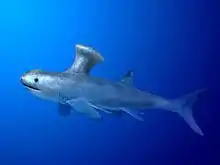Akmonistion
Akmonistion is an extinct genus of holocephalian that lived in the Early Carboniferous. The genus contains a single species, A. zangerli, discovered by Stan Wood in 1982.[1] It is distinguished by an unusual enlarged formation of the dorsal fin, called a "spine-brush complex", of unknown function. This is also found in the better known genus Stethacanthus. Remains have only been found near Bearsden in Scotland.[2][3] The genus name is derived from the Ancient Greek “akmon” (“anvil”) + “istion” (“sail”) referring to the appearance of its first dorsal fin.[2] It reached 62 cm (24 in) in length.[2]
 Reconstruction
Reconstruction
| Akmonistion Temporal range: | |
|---|---|
 | |
| Holotype fossil | |
| Scientific classification | |
| Domain: | Eukaryota |
| Kingdom: | Animalia |
| Phylum: | Chordata |
| Class: | Chondrichthyes |
| Order: | †Symmoriiformes |
| Family: | †Stethacanthidae |
| Genus: | †Akmonistion |
| Species: | †A. zangerli |
| Binomial name | |
| †Akmonistion zangerli Coates & Sequeira, 2001 | |
References
- Wood, S.P. (1982). "New basal Namurian (Upper Carboniferous) fishes and crustaceans found near Glasgow". Nature. 297: 574–577.
- Coates, M.I.; Sequeira, S.E.K. (2001). "A new stethacanthid chondrichthyan from the lower Carboniferous of Bearsden, Scotland" (PDF). Journal of Vertebrate Paleontology. 21 (3): 438–459. doi:10.1671/0272-4634(2001)021[0438:anscft]2.0.co;2.
- "Akmonistion zangerli". Palaeobiology Database.
This article is issued from Wikipedia. The text is licensed under Creative Commons - Attribution - Sharealike. Additional terms may apply for the media files.